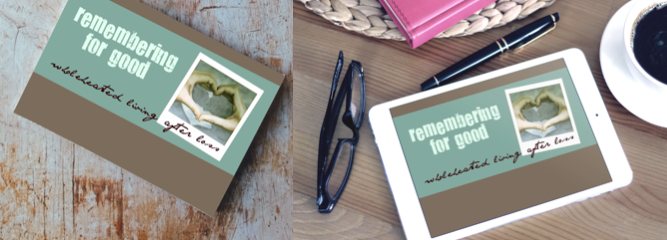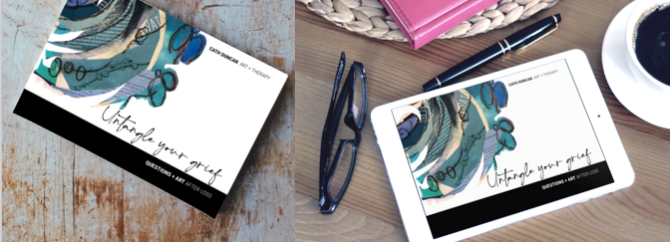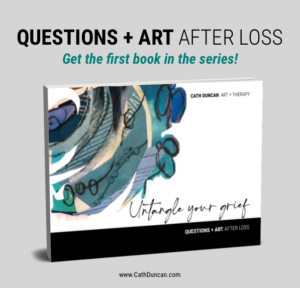Today is the first anniversary of the day that we met and said goodbye to our daughter, Juggernaut. Andy and I have headed out to the Rocky Mountains for the weekend to breathe in the mountain air, bond, rest, reflect and remember her.
It’s an important day to us, but what do you do on the anniversary of the death of a child who didn’t live long enough for you to get to know her personality and quirks, or even for our friends and family to meet her? Who or what are we remembering? And who’ll join us in remembering? There aren’t any common customs and practices for this and it’s often a hard and lonely day for grieving parents.
I can understand why many people choose to withdraw and grieve in private. Grieving in community can feel more complicated. It can take a fair bit of communication to synch together and find ways to grieve and remember together that allow for each of us to have our own unique experience of grief and yet also share our common experiences. And in the modern Western world we carry a lot of shame about loss and grief. I’ve felt it.
Andy and I really wanted to find a way to stay connected and to share this day with the compassionate communities that we’re a part of all over the world, because we believe that grieving in community helps us all to be more resilient, resourceful, courageous and wholehearted through all of our losses and gains in life.
The Differences Between Ruminating And Remembering
Some people worry that deliberately remembering your loved one who died or the events around their death will invite negativity, sadness, anger and bitterness into your life. And many people worry that if they talk about the person you loved and lost, they’re going to upset you more – especially if they do it on the anniversary of their death. These fears are myths and they’re probably some of the drivers behind the popularity of the myth of “closure” that we’re so keen to pursue in the modern Western world.
I know that we’ll shed some tears this weekend, but I also know that Andy and I will have conversations that will enrich us and expand our hearts, because we’ve learned the difference between ruminating and remembering. This weekend we’re going to be remembering, not ruminating. And, whether you’re a close friend, one of our family, or a new reader here, this is an open invitation for you to join us, if that feels good to you.
First, I want to be clear about the difference between ruminating and remembering, because I think we’re often mixed up about that. So here’s a quick lesson in the way our brains and emotions work…
As events happen in our lives, we’re perceiving them and taking in information about what’s going on. We can’t consciously take in all of the information so, for efficiency, our brains filter the information and focus on the information that it deems most important. The bits of information in between get deleted, distorted or generalized. Using that information, we appraise the events as “good” or “bad” and we tell a brief story about what those events mean. Our appraisal and story is what causes our emotional reaction. As much as grieving emotions can feel very “out of control,” when you understand how emotions work, you’ll realize that we can choose to change the emotions we’re creating by changing how we filter our information or the appraisals and meaning that we make of the information.
When we’re ruminating we’re not exercising mindfulness in our filtering or story-telling and meaning-making. When we’re ruminating, we’re focusing on the scary or awful information in our memories and we’re not noticing the other neutral or even positive pieces of information. We all do this easily and frequently. Our brains have a natural wiring to focus on “negative” or scary information, because that’s how we stay alert to danger so we can protect ourselves. But, as Helen Keller said…
“All the world is full of suffering. It is also full of overcoming.”
Reality is diverse and living wholeheartedly is about opening to seeing – and feeling – all that life has to offer. Both the suffering and the overcoming.
When we’re ruminating we’re mindlessly repeating old, tired, painful stories to ourselves over and over again. We’re resisting reality and forcing against things that can’t be changed, rather than noticing what can be changed or created in the spaces that have opened up. We’re asking unanswerable questions like, “Why me?” and, “Was there anything I could have done to stop her from dying?” Such questions will always be a mystery, so they trap us in an infinite loop of torturing ourselves with painful imaginary answers that will never be proven or disproven. Because of what we focus our attention on and what we don’t notice when we’re ruminating, ruminating gets us stuck in negative emotion and closes off our access to the rich resources and wisdom in our past and the opportunities for growth, meaning, love, joy and hope right now and in our future.
Remembering Instead
Contrary to the common pop-psychology mantra that you need to “express your emotions”, remembering is not primarily about expressing grieving emotions – although it might facilitate that sort of release at times. Remembering is primarily about affirming the miracle and significance of each of our lives, and mining the resources from the challenges we’ve endured.
When we’re remembering, we’re slowing down to observe the diversity and fullness of life – all of it’s suffering and all of it’s overcoming. Rather than letting the default fear-focus and negativity bias of our cognitive wiring run the show, when we remember, we exercise appreciative enquiry, deliberately looking for the beautiful details, the things we’re grateful for, the baby joys being birthed between the cracks and the wisdom that’s already settled and matured in the dark spots. Remembering involves actively searching for evidence of resourcefulness and resilience within our relationships and experiences, so that the sufferings we endure become guideposts to point us to what we really value and raw materials for creating more of what we love in the world.
Remembering isn’t concerned with the so-called “facts” of the situation. Instead, remembering is a creative process. Each time we remember, we re-construct the events of the past and there’s opportunity to add to the story or re-interpret the meanings. Deliberate remembering keeps our stories alive and things that live grow and change over time. Remembering allows you to have an ever-evolving relationship with your grief and to re-tell and edit your stories so that you change your stories and your stories change you. Change invites new possibility, creativity, freedom and life – you, bursting into full bloom.
“I hope you will go out and let stories happen to you, and that you will work them, water them with your blood and tears and your laughter till they bloom, till you yourself burst into bloom.” ― Clarissa Pinkola Estés
Andy and I will be having remembering conversations with each other this weekend. Here’s some of what we’ll be reflecting on:
- Looking back on this past year, how has loving and losing Juggernaut changed us for good?
- What’s become more important to us, because of our loving and losing Juggernaut? And how is this coming through in the choices we’re making now?
- What ideas and new little joys has loving and losing Juggernaut inspired in us, and how do we hope to bring more life to those ideas in the next year?
If you’d like to join us…
We’ve been so fortunate to have a wide circle of family and friends who are either already well-versed in these sorts of appreciative remembering conversations, or have been willing to learn to do them. In the modern Western world, we tend to think that self-identity and the construction of meaning is an individual process, but really we’re communal creatures and the way we see ourselves and the way we interpret the events of our lives is informed by multiple voices. Our experience this past year has been that whenever we invite our friends and family to join us in reflecting and making meaning, their voices have enriched our lives, added so much wisdom and resourcefulness and perhaps most of all, affirmed the significance of our lives and Juggernaut’s short life. These are invaluable gifts – gifts that offer a stark contrast and help us to appreciate the fullness of life and the overcoming alongside our suffering.
So if you’d like to join us in remembering Juggernaut and her impact on our lives and beyond, then we’d love that and we’d invite you to share your reflections on any of the points below. Feel free to post your reflections here if you’re comfortable with that, or if you’d prefer to do it privately, then email me at cath (at) rememberingforgood (dot) com.
- If you’ve been following our journey here, at AgileLiving.net, on Facebook or offline, then we’d love to hear about any specific positive ways that you’ve noticed that we’ve been changed by Juggernaut. Sometimes other people can see that stuff better than you yourself can.
- We know that we’re just ordinary people dealing with ordinary human suffering and you all have your own experiences of love and loss that have been huge for you. If you’ve been changed or helped in any way in your grieving journey by our sharing our experience of loving and losing Juggernaut with you, then we’d love to hear about that. Contribution and service are high values for Andy and me, so hearing that our family has impacted the world in some positive way helps us to create liberating and soul-enriching meanings out of our loss.
- Knowing a bit about where we are now in our journey, and considering the experience and wisdom you’ve gained through your own experiences of love and loss, if you could gift us with an internal resource or an intangible blessing of some sort, what would you love to give us that would serve us as our story evolves?
Would you like guidance to explore and heal your grief?
I’ve put together a 35-page grief “workbook” for you; an introduction to Remembering For Good and living wholeheartedly after loss. Learn more about the Remembering For Good grief workbook.
The first book in the QUESTIONS + ART AFTER LOSS series, Untangle Your Grief is a beautiful 65-page book of artful questions and creativity-sparking art prompts to help you to create meaning, belonging, and hope after loss.




You are changing the world. For Good. Sending you and yours much love today.
@MarthaAtkins Thank you, Martha. That means a lot to me.
Cath, I think you already know this, but it bears repeating. Your openness and thoughtfulness about your experience continues to be so wonderfully healing for me. I read your initial post about Juggernaut very soon after reading “An exact replica of a figment of my imagination” by Elizabeth McCracken. That book cracked me right open, and then serendipitously, there you were to hold my hand through that experience. For me the healing is not only about the loss of my baby, but the many small, accumulated losses that followed as I kept silent about it. You and Andy and Juggernaut are a gift in my life. xoxo
@Lianne_R Thank you for the gift of telling us this, Lianne. Hearing this sort of thing provides a strong contrast of love, creativity and generativity that sits alongside what we’ve lost. I know that having lost your own child you appreciate how big that loss is, so you’ll appreciate how much this means to me when I say that hearing that what we’ve shared has served you in some way balances the loss and the love and makes it all seem ok.
Dear Cathy and Andy, it is with great sadness that we remember Juggernaut’s first birthday. You are truly loved and I know it has not been easy for you guys this past year. There are plans far greater than we will ever know or dream of, and many questions to ask too. You both have been blessed with many incredible gifts, especially that of comforting others. I pray that you both be comforted and feel peace in your hearts. You have always been an inspiration to me, especially in my teenage years when I saw that I wanted what you had.
I love you,
Your brother
Alan
@abedwell Thanks, Boet. Really appreciate your love and support and encouragement all along. Big love.
I have so many things I want to share. But, they’re just rolling around randomly in my head right now. Most likely because October was the month I conceived C.J. which makes it almost as difficult for me as January (the month I lost him). I promise you, dear friend, I will be back to share my thoughts later.
For now, please know that you, Andy & Juggernaut are in my heart and in my prayers.
@kellie.j.walker Kellie, there are so many ways that our paths cross, overlap and intertwine. You know how some people become friends because their children play together… I have a few folks like you and heather plett and dana boyle lapointe and others who’ve been brought into my life because of our children who died. I’m so grateful for that. Big love.